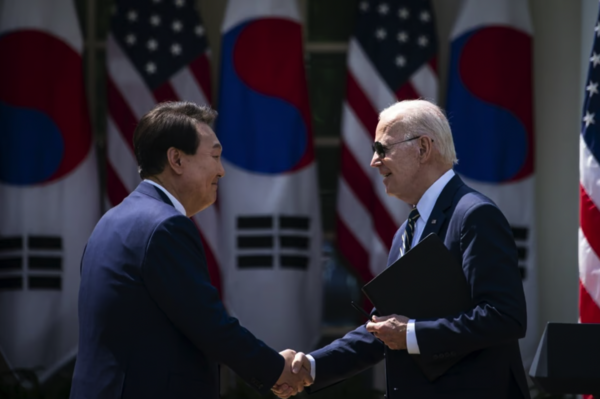North Korea’s rapid expansion of nuclear weaponry and the recent threats of preemptive attack has escalated the sense of urgency and vulnerability on South Korea’s part, increasing its reliance on US protection. The Washington Declaration, signed by South Korean President Yoon Suk Yeol and his US counterpart Joe Biden, signals the commitment of both countries to developing their mutual defense posture under the US-ROK Alliance. The new agreement was signed on April 26 as a salute to the 70th anniversary of the US-ROK Mutual Defense Treaty, which was established in 1953.

The establishment of the Washington Declaration is supposed to be a big step; the principle of alliance-reliant response — which already bleeds through the way in which the South Korean and US military forces join forces under the Combined Forces Command — is expanded to the nuclear dimension. Under this newfound agreement, a Nuclear Consultative Group (NCG) will be created by the US. This will provide South Korea further insight into US military intentions regarding the conflicts in the peninsula, and allegedly give South Korea a voice in those deliberations. In addition, US nuclear submarines are able to dock in South Korea for the first time in 40 years. The US administration expects to deploy bombers, aircraft, and ballistic missile submarines more regularly to the Korean Peninsula. For now, North Korea’s provocations, an effort to dissolve South Korea and the US’s military alliance, seem to have encouraged the opposite of the desired effect.
However, the US’s nuclear-free tactic — which began in 1991 when the US withdrew all nuclear weapons from the Korean Peninsula — seems to persist. The US administration officers were quoted by CBS News that it is “crystal clear” that the cabinet has no intention to permanently return any type of nuclear weapons to the peninsula.The new agreement also implicitly renews South Korea’s pledge to abstain from developing its own nuclear weaponry and continue its commitment to the Nuclear Nonproliferation Treaty. Yoon seems to be betting on a de-escalation tactic by committing to a joint response rather than that of an individual, aggressive one which includes preparations for combat.
Whether Yoon’s bet will be fruitful is another discussion, as the efficacy of the US’s safeguarding of South Korea relies on the assumption that the US would deliver a counterattack if North Korea were to use tactical nuclear weapons on South Korea. Years ago, it seemed highly likely that the US would retaliate to defend South Korea. But North Korea’s successful development of intercontinental ballistic missiles puts the US in range of North Korea’s arsenal, meaning the price of protecting South Korea has grown much higher. Although Biden asserted that he would “end whatever regime” if there is a “nuclear attack by North Korea against the United States or its allies”, many experts believe that the US's willingness to retaliate is unconvincing. Given the explicit statements that confirm there will be no docking of US nuclear weapons in the Peninsula, it seems likely that the US is unable to convince Pyongyang of a real threat; seasonal visits of US nuclear submarines have not deterred North Korea in the past, so it seems unlikely that deploying them once more will be enough to deter Pyongyang now.
So, despite the new agreement, the US response could remain unchanged in effect. Even when taken at best — say, the US does drastically change its response in efforts to deter North Korea — it is difficult to foresee a continuation of these efforts after a few months, when the US administration will be forced to return their attention to other more immediate political priorities.
The Washington declaration seems to be the right step in engaging joint military planning and proclaiming a continued alliance between Seoul and Washington. However, it seems that the declaration will not bring about tangible effects anytime soon. The consistent unpredictability of Pyongyang's politics, in combination with the declaration's inability to show clear commitment from the US administration to retaliate against North Korea with nuclear weapons, leads to a question: Did Washington establish the new declaration to deter Pyongyang, or really, to placate Seoul?

